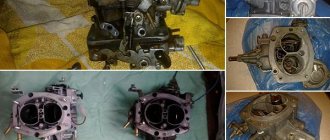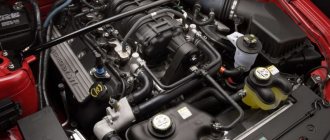As the name suggests, diesel fuel is used in diesel engines. It is produced by direct distillation of oil from kerosene-gas oil fractions of gas condensate fields. People call this fuel “diesel oil” or “diesel fuel”. Let's find out how diesel differs from gasoline, which fuel is better, and why winter diesel fuel does not freeze?
What is gasoline
This is petroleum fuel, a flammable mixture of light hydrocarbons. Under normal conditions it is a liquid with a strong odor. The chain length of the alkanes and cycloalkanes that make up gasoline is not less than 5 carbon atoms, but not more than 12.
In very general terms, gasoline production consists of 3 main stages:
- Fractional distillation or distillation. Oil is pumped into special tall containers resembling columns and heated to 315 degrees Celsius. As a result, it is divided into fractions: gasoline, natural gas, kerosene, etc.
- Purification of gasoline fraction from impurities. For this purpose, catalysts, high pressure and temperatures are used. The purpose of the action is to destroy large molecules.
- Adding additives. They are needed to improve the combustion of gasoline and prevent engine damage.
Operating principle of motors
Both diesel and gasoline power units are internal combustion engines.
In a gasoline engine, the air-fuel mixture is formed in the intake manifold, that is, outside the cylinder. At the end of the compression stroke, gasoline vapor and air are mixed. This homogeneous mixture is evenly distributed throughout the volume. The result of compression is an increase in the temperature of the mixture to 500˚C - this figure is lower than the ignition temperature of gasoline. The spark plugs provide a spark and the mixture ignites.
In a diesel engine , only air is compressed at a pressure of 30–50 bar. As a result of compression, the air temperature rises to 900˚C. At the same time, diesel fuel is sprayed into the combustion chamber before the top dead center of the piston. Small drops of liquid evaporate, forming a fuel-air mixture, which is called heterogeneous - it spontaneously ignites and burns.
What is diesel fuel
This is an oil fuel that ignites not from a spark, but from a sharp increase in pressure. The length of the carbon chain is over 12 atoms. Diesel fuel is named after Rudolf Diesel, who made a great contribution to the creation of diesel engines in the late 19th and early 20th centuries. The production of diesel fuel consists of the same steps as the production of gasoline, only the heavier fraction is extracted and purified from the columns.
We offer to buy diesel fuel in Moscow from our company at competitive prices. selling diesel fuel for quite a long time, we have a reputation in the market.
Environmental fuel standards for diesel engines
- Euro-3 is an already outdated diesel fuel standard that was relevant until 2005 (in the EU). After the emergence of new requirements, Euro-3 no longer met the standards and was discontinued;
- Euro-4 is a relatively new standard that replaced the out-of-use Euro-3 standard. In the EU, Euro 4 began to be used in 2005. Since the beginning of 2013, all vehicles imported into Russia must comply with this class. The only exception is cars produced before the end of 2012. For them, compliance with the older standard is still allowed;
- Euro-3. In the near future, it is planned to completely ban the operation of cars with a standard lower than Euro-4;
- Euro 5 standard is the newest. In the EU, its compliance is mandatory for trucks manufactured since 10/2008, and for passenger cars - since 09/2009. The standard is also valid in the Russian Federation. In particular, it applies to all cars that are imported into the territory of the state;
- Biodiesel is a special type of fuel. Its peculiarity is the presence of animal and vegetable fats. Actually, the structure of diesel fuel itself is completely natural, and the composition is the result of processing soybeans, rapeseed and other plants. The peculiarity of the fuel is that it can be used both in pure form and as a special additive to conventional fuels.
Biodiesel can be recognized by its special designation. Thus, in the USA, the presence of biodiesel in the composition can be judged by the presence of the letter “B” in the name. Next is a figure that shows the percentage of the special composition in the total mass. As for the color number, for this type of fuel it is about 50-51.
Difference between gasoline and diesel fuel
There are more than similarities.
- Chemical composition. Cycloalkanes and alkanes that form gasoline have shorter hydrocarbon lengths than similar chemical compounds in diesel fuel.
- Physical properties. Gasoline is more volatile and flammable than diesel fuel and also has a lower density.
- Energy efficiency. The combustion of diesel fuel releases more energy than the combustion of gasoline. This means that diesel will last the car a longer distance than the same amount of gasoline.
- Ignition temperature. Gasoline has a temperature of 246 degrees Celsius. Diesel fuel has -210 degrees Celsius.
- Combustion products. When burning gasoline, more carbon dioxide and carbon monoxide are produced than when burning diesel fuel. However, gasoline burns more cleanly, and there are no small solid suspended particles in the final combustion products.
- Speed mode. Gasoline engines operate at higher speeds than diesel engines. Installed on cars designed for high speeds.
- Purpose. Diesel fuel is widely used for heating homes. It is not advisable to use gasoline for these purposes.
Although the cost of diesel fuel varies, in general it remains acceptable for the vast majority of citizens. The cheapest and easiest way to buy diesel fuel with delivery Contact us.
Characteristics of automobile fuel
Fuel calorific value
Typically, the net heating value Hn determines the energy content of the fuel; it corresponds to the usable amount of heat released during complete combustion. The gross heating value of Hg, on the other hand, defines the total heat, including both mechanically generated heat and the heat generated by condensation of water vapor. However, this component is not taken into account for automobiles.
The net calorific value of diesel fuel, equal to 42.9-43.1 MJ/kg, is slightly higher than that of gasoline (40.1-41.9 MJ/kg).
Oxidizers, that is, fuels or fuel components containing oxygen such as alcohol fuels, fatty acid esters or methyl esters, have a lower heating value than pure hydrocarbons because the oxygen present in these compounds does not contribute to the combustion process. Therefore, an engine with comparable power to a motor powered by conventional fuel has increased fuel consumption.
Heat of combustion of the air-fuel mixture
The heat of combustion of the air-fuel mixture determines the power output of the engine. At a stoichiometric air/fuel ratio, the calorific value for liquefied gaseous and liquid automobile fuels is approximately 3.5-3.7 MJ/m3.
Sulfur content in automobile fuel
In the interests of reducing emissions of sulfur dioxide SO2 and protecting exhaust gas catalytic converters, the sulfur content of gasoline and diesel fuel has been limited since 2009 to 10 mg/kg throughout Europe. Fuel meeting this limit is known as "sulfur-free fuel". Thus, fuel desulfurization is achieved. Until 2009, the use of fuel with a sulfur content of <50 mg/kg was permitted for use in Europe, introduced at the beginning of 2005. Germany is a leader in fuel desulfurization - since 2003, due to tax measures, the country has been using sulfur-free fuels.
In the United States, the sulfur content limit for commercially produced gasoline has been capped at 80 mg/kg since 2006, with an average of 30 mg/kg for total fuel sold and imported. Some states, such as California, have set lower limits.
In addition, since 2006, sulfur-free diesel fuel has been produced in the United States (sulfur content is a maximum of 15 mg/kg, ULSD - ultra-low sulfur diesel). By the end of 2009, however, only 20% of fuel had a sulfur content of no more than 500 mg/kg.
The sulfur content in certified fuel serves as the basis for changes in regulatory documents.
Catalyst and particulate filter
In addition to useful work, any internal combustion engine produces exhaust gases. To make them less toxic, before they are released into the atmosphere, they are cleaned with special devices - catalytic converters, or simply catalysts. The catalyst consists of a ceramic honeycomb with a catalytic neutralizing layer (usually platinum).
The catalyst is used in both gasoline and diesel engines. But we remember the differences in fuel: diesel is heavier and oilier. In addition to gases, a diesel internal combustion engine produces soot, which the catalyst cannot remove.
To capture soot, another element is used - a particulate filter. It consists of a metal body in which a ceramic cellular matrix with porous tubes is located. Gas passes freely through the cells and tubes, and soot particles get stuck in the porous channels and remain in the particulate filter.
Some diesel cars have an additional cleaning system - injection of artificial urea AdBlue into the exhaust pipe. A reagent solution (water and ammonia) is injected into the tract and mixed with gases, neutralizing harmful substances. AdBlue consumption is very low, but it is better to always have a bottle or two with you: if the urea suddenly runs out, the car will not even start. This is how environmentally friendly firmware works.
Briefly:
Recommendations for selection
Comparing the cost and expenses of a car is a good opportunity to evaluate the advantages and disadvantages of engines in quantitative terms. It is recommended to choose a gasoline model in the following cases:
- for trips within city limits;
- with a small engine volume;
- for driving at high speeds.
Cars with diesel engines can withstand off-road travel better, but the owner will have to more carefully monitor the condition of the fuel filters and undergo maintenance at the frequency recommended by the manufacturer. The higher cost of the car will be paid off by fuel savings in 3-5 years.
Which car is more appropriate for you to buy - diesel or gasoline?
- The most powerful car engine
- Which engine is the most reliable?
- The best diesel engines for passenger cars
- The difference between antifreeze and antifreeze, which is better?
- Oil additives for engine restoration
The difference between diesel and gasoline in maintenance
Why is diesel more expensive than gasoline if its maintenance also costs more? There are several reasons:
- There are 4-5 times fewer service stations servicing diesel engines, and mechanics deliberately raise the cost;
- Passenger cars are rarely equipped with diesel engines, the repairs of which are by definition cheaper;
- the established trend is that diesel is a feature of trucks and buses (which are also more expensive to repair).
What to choose - gasoline or diesel? The service interval for the first is from 15 to 20 thousand kilometers, for the second - 8-10 thousand. Oils are more expensive for them, as are consumables. From the point of view of regular maintenance, gasoline is a clear winner.
Noise and emissions
According to the first parameter, a gasoline engine is preferable, since its operation is characterized by low noise. The disadvantages of a diesel engine are eliminated if high-quality sound insulation is installed. The toxicity of gasoline is higher, and it contains more harmful compounds for both the environment and human health. It is also worth noting that diesel fuel evaporates less intensely, which reduces the likelihood of unexpected ignition.
Throttle function
The throttle valve is present in any intake system. It is located between the intake manifold and the air filter and regulates air flow. But there is a significant difference in why it is needed in gasoline and diesel engines.
In a nutshell: in a gasoline engine, the throttle valve always works, thanks to it, fuel combustion occurs in the cylinders. In a diesel engine, the throttle shuts down the internal combustion engine and helps environmental systems.
How much does 1 liter of diesel fuel cost in Russia?
Price of 1 liter of diesel fuel
depends on the geographic location of the area and the current state of the fuel market. ... PRICE
| Fuel name | Density | Price per liter |
| Unleaded gasoline AI-95-K5 | 0.744 | 46.65 rub. |
| Unleaded gasoline AI-92-K5 | 0.739 | 44.34 rub. |
| Unleaded gasoline AI-100-K5 | 0.75 | RUB 53.03 |
| Kerosene RT | 0.821 | 44.17 rub. |
Interesting materials:
How to connect your phone to TV via YouTube? How to connect your phone to TV via MHL? How to connect a phone to a TV via a t2 set-top box? How to connect your phone to your TV via a digital set-top box? How to connect your phone to TV via Type-C? How to connect your phone to TV via USB to watch movies? How to connect your phone to TV via USB HDMI? How to connect your phone to your TV via USB and watch YouTube? How to connect your phone to TV via USB Samsung? How to connect your phone to TV via USB cable?
Which is more profitable to drive: diesel or gasoline?
You can choose the type of fuel based on indirect and direct benefits. For example, price - the less 1 liter of fuel costs, the more profitable it is for you. And the lower the fuel consumption, the more profitable it is. A car with a diesel engine meets these conditions.
If we talk about indirect benefits, then we can reconsider the decision. For example, acceleration and speed will be better in a car with a gasoline engine. Therefore, if the issue of fuel cost is secondary for you, buy a car with a gasoline engine.
You can compare both options for repairs. The breakdowns themselves can be complex for one or the other. Although, it is with a diesel engine that the device is considered technically more complex. This means that repairs will be more labor-intensive and expensive. On the other hand, the diesel engine is more durable and durable.
Pros and cons of diesel fuel and gasoline
There are many advantages of diesel and gasoline. There are also disadvantages, but they can be easily solved by choosing the right gas station and monitoring the technical condition of the car. The only difference between gasoline and diesel fuel is temperature suitability.
On gasoline, the car will start at any minus readings. And diesel fuel must be selected according to the season: summer, winter or arctic. This is connected precisely with what we talked about at the very beginning: the amount of carbon. In diesel it is high and the liquid becomes viscous as the temperature drops.
Mixing gasoline and diesel fuel will not improve the formula created by chemists. So it’s not worth experimenting to increase power or improve the ignition of a diesel engine in the cold.
Gasoline vs diesel: the bottom line
As you can see, buying a car with a gasoline or diesel engine is a difficult dilemma. At the end of the last century, the first place could have been given to the gasoline model. After all, diesel engines polluted the atmosphere more and did not start in the cold. And a gas station with normal diesel fuel was difficult to find due to long-standing GOST standards, in which standard diesel engines were closer to diesel fuel.
Today, the gasoline engine is no longer in first place. Diesel caught up with it in all respects:
To increase speed, the technical parameters of cars have been changed;
the filtration system has been improved to reduce exhaust gases;
To operate at sub-zero temperatures, diesel fuel contains complex additives that prevent the liquid from turning into paraffin.
A car with a gasoline engine or a diesel engine - it's up to you. But keep in mind that the diesel improvements described apply to cars of the last years of production.
Source











